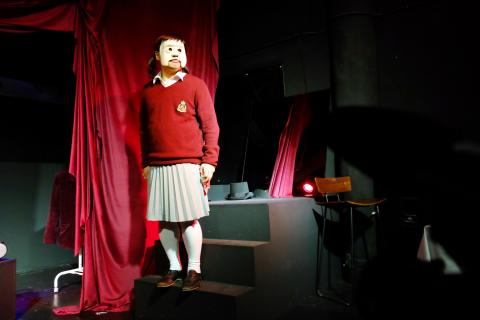Lab Space kicks of this season with an engaging Theater Ignite production of Kristen Thomson’s challenging I, Claudia. This one actor tour-de-force will leave you laughing sympathetically for the lost dreams of each character.
Derek Kwan (關顯揚) stars as the one who must pull off four different roles (two male and two female). Each requires a different voice, mood and emotion as all subtly or not so subtly reveal their “shit luck” experiences with life.
The main protagonist is Claudia, an emotional pre-teen who draws most of our sympathy. Her life is on overload as she copes with puberty, her parents’ divorce, lack of popularity at school and a failing science project.

Photo courtesy of JJ Chen
The school custodian, Drachman, allows Claudia to use the basement as a hideaway to sort out her troubles. Before he immigrated to Canada, he dreamed of being an actor, but premature baldness at age twenty-two cut that short. He closes the play with a folk tale of wisdom gained through tears of disappointment.
As Douglas, Claudia’s aging grandfather, Kwan has to slow down. Douglas loves Claudia but is lost in his own grief over the recent death of his wife.
And then there is Leslie, the party girl, who after dating several assholes lands David, Claudia’s father. She has bounced through life with little heed for the destruction in her wake but she feels her upcoming marriage will be a way to thumb her nose at her relations and show them she got it right in the end.
Separate masks for each character along with simple costume changes allow Kwan to masterfully focus on the required multiple changes of temperament.
Claudia’s parents are unseen but like any child who has experienced divorce, she hopes to bring them back together. We delight in her honesty and simple judgment yet feel for her pain.

William Liu (劉家君) moved to Kaohsiung from Nantou to live with his boyfriend Reg Hong (洪嘉佑). “In Nantou, people do not support gay rights at all and never even talk about it. Living here made me optimistic and made me realize how much I can express myself,” Liu tells the Taipei Times. Hong and his friend Cony Hsieh (謝昀希) are both active in several LGBT groups and organizations in Kaohsiung. They were among the people behind the city’s 16th Pride event in November last year, which gathered over 35,000 people. Along with others, they clearly see Kaohsiung as the nexus of LGBT rights.

Dissident artist Ai Weiwei’s (艾未未) famous return to the People’s Republic of China (PRC) has been overshadowed by the astonishing news of the latest arrests of senior military figures for “corruption,” but it is an interesting piece of news in its own right, though more for what Ai does not understand than for what he does. Ai simply lacks the reflective understanding that the loneliness and isolation he imagines are “European” are simply the joys of life as an expat. That goes both ways: “I love Taiwan!” say many still wet-behind-the-ears expats here, not realizing what they love is being an

In the American west, “it is said, water flows upwards towards money,” wrote Marc Reisner in one of the most compelling books on public policy ever written, Cadillac Desert. As Americans failed to overcome the West’s water scarcity with hard work and private capital, the Federal government came to the rescue. As Reisner describes: “the American West quietly became the first and most durable example of the modern welfare state.” In Taiwan, the money toward which water flows upwards is the high tech industry, particularly the chip powerhouse Taiwan Semiconductor Manufacturing Co (TSMC, 台積電). Typically articles on TSMC’s water demand

Every now and then, even hardcore hikers like to sleep in, leave the heavy gear at home and just enjoy a relaxed half-day stroll in the mountains: no cold, no steep uphills, no pressure to walk a certain distance in a day. In the winter, the mild climate and lower elevations of the forests in Taiwan’s far south offer a number of easy escapes like this. A prime example is the river above Mudan Reservoir (牡丹水庫): with shallow water, gentle current, abundant wildlife and a complete lack of tourists, this walk is accessible to nearly everyone but still feels quite remote.